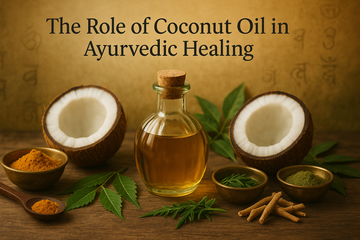Ayurveda, derived from the Sanskrit words Ayur (life) and Veda (knowledge), is one of the world’s oldest systems of natural healing—originating in India over 5,000 years ago. More than just a medical system, Ayurveda is a complete lifestyle approach focused on achieving balance in body, mind, and spirit. Among the many natural ingredients used in Ayurvedic healing, coconut oil holds a sacred and therapeutic role, especially in Kerala—the land where both Ayurveda and coconuts flourish.

1. Traditional View of Ayurveda: Healing in Harmony
Ayurveda views health as a state of balance among the three doshas: Vata (air & space), Pitta (fire & water), and Kapha (earth & water). Rather than treating symptoms, Ayurveda identifies the root cause of illness and offers personalized solutions through diet, herbal remedies, yoga, meditation, and oil therapies. Coconut oil plays a major role in this holistic system due to its healing, nourishing, and balancing properties.
2. Kera, Kerala, and Ayurveda: A Natural Bond
The name Kerala is believed to be derived from Kera (coconut tree) and Alam (land), meaning “Land of Coconuts.” Kerala is also the traditional heartland of Ayurveda. Here, coconut oil is more than just a cooking medium—it is considered a sacred, healing oil. It is used extensively in Panchakarma therapies, body massages, and herbal formulations for treating ailments and promoting overall wellness.
3. Three Pillars of Ayurvedic Healing & Coconut Oil’s Role
The foundation of Ayurvedic healing lies in:
-
Ahara (Diet)
-
Vihara (Lifestyle)
-
Aushadha (Medicine)
Among these, Aushadha connects most deeply with coconut oil. It is widely used in preparing herbal oils, balms, nasya drops (for nasal cleansing), and therapeutic massage oils. Coconut oil enhances the medicinal properties of herbs and improves their absorption into the body.
4. Coconut Oil as a Medicinal Ingredients
Virgin coconut oil is rich in lauric acid, which has scientifically proven antimicrobial, anti-inflammatory, and antioxidant properties:
-
Antimicrobial: Fights infections and protects against harmful microbes.
-
Anti-inflammatory: Helps reduce swelling and joint pain.
-
Antioxidant: Shields the body’s cells from free radical damage.
These properties make coconut oil an ideal base for Ayurvedic internal and external treatments—from wound healing to immune support and skincare.
5. What Science Says About Abhyanga (Oil Massage)
The Ayurvedic practice of Abhyanga—full-body massage with warm oil—has been supported by modern research. When coconut oil is used, it offers several scientifically proven benefits:
-
Improves blood circulation and lymphatic drainage
-
Enhances nervous system function and reduces stress hormones
-
Strengthens the skin barrier and promotes deep hydration
-
Relieves anxiety, muscle tension, and promotes quality sleep
Regular Abhyanga is an effective therapy for both physical and emotional well-being.
6. How Coconut Oil Supports Healing in Ayurveda
-
Coconut oil supports the healing process across multiple Ayurvedic dimensions:
-
Cooling in Nature: Calms Pitta dosha and reduces inflammation
-
Disinfects Skin & Wounds: Natural antibacterial and antifungal properties
-
Nourishes Body Tissues (Dhatus): Strengthens muscles, nerves, and skin
-
Boosts Digestion (Agni): Supports metabolism when consumed in moderation
-
Calms the Mind: Its aroma and composition soothe the nervous system

Conclusion: A Sacred Oil with Timeless Value
Coconut oil is not just a cooking ingredient—it is a cornerstone of Ayurvedic medicine, deeply respected for its ability to heal, nourish, and protect. From ancient Kerala traditions to modern clinical validation, its benefits remain relevant and powerful. When used in its purest form—cold-pressed, virgin coconut oil—and combined with the right herbs, it transforms into a natural healer for both body and mind.
Frequently Asked Questions (FAQs)
Q1: How is coconut oil used in Ayurvedic medicine?
A: Coconut oil is used in herbal preparations, Abhyanga massages, Nasya therapies, and skin/hair treatments for its nourishing and healing properties.
Q2: Why is Kerala coconut oil preferred in Ayurveda?
A: Kerala coconut oil is cold-pressed and chemical-free, made from coconuts grown in rich, pesticide-free soil. This preserves its natural nutrients and medicinal potency.
Q3: What are the benefits of Ayurvedic massage with coconut oil?
A: It improves circulation, relieves stress, nourishes joints and skin, boosts immunity, and supports nervous system health.
Q4: Is there scientific proof for using coconut oil in Ayurvedic healing?
A: Yes. Research confirms its anti-inflammatory, antimicrobial, and antioxidant effects, supporting its use in skin health, digestion, and inflammation reduction.
Q5: Can I use edible coconut oil for Ayurvedic treatments at home?
A: Yes, but use only virgin, cold-pressed coconut oil—free from additives—for massages, scalp treatments, oil pulling, and topical applications.







